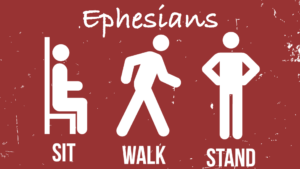Everyone wants unity, but nobody really knows how to achieve it.
Most people today seem to think that unity requires conformity. We think that unity is achieved when everybody thinks the same way, talks the same way, dresses the same way, and has the same opinions. Where differences occur, division results, and unity dies. And some people seek to achieve unity by silencing and cancelling those who have different opinions.
You see, when we are in a conflict with someone, we think it is the responsibility of the other person to change their ways, so we can get along with them. We point at their faults and what they said, or what they did, and say that if there is going to be peace, they have to change. Paul challenges all of this in Ephesians 4:1-3. In these verses, Paul shows how we can have unity with others even when there is disagreement.

Question from a Reader
Can you tell me your position on the Trinity? Do you have a book about your views on the Trinity? Thanks, Ed
I have written a few articles about the Trinity on my website. Here is one called “I’ll define the Trinity … if you Define God.”
I do believe God is a Trinity. That God is three persons in one being. I also go on to state several reasons why I believe in the Trinity.
I like to think that some of my reasons for believe in the the Trinity are a little different than what you might find in a typical theology book, but you can read the article and decide for yourself.
Just one example.
All Christians believe that the essence of God does not change. In theological terms, we say that God is immutable. God is unchangeable.
All Christians also believe that God is relational. That God loves. That God communicates.
But think on this … in eternity past … before there were humans and before there were angels, when it was just God … how could God be relational if God does not exist as a Trinity? It would be impossible. God cannot be relational when there is nobody to relate to.
Therefore, if God does not eternally exist as a Triune being, then God would have not be eternally relational. God would not eternally loving. The relational and loving aspects of God would only be added to God once God created angels and humans.
But this contradicts the central idea of God’s immutability, that God does not change.
So the ONLY way God can be immutable and eternally relational is if God exists as a Trinity. Only in this way God can be eternally loving and relational.
Anyway, that’s some food for thought. Go read that article on the Trinity if you want to learn more.
We are discussing a similar concept in our study of Ephesians 4 today. We will be looking at unity, which is also an eternal attribute of God that could not exist without being a Trinity.
The Church Must Lead the World into Peace (Ephesians 4:1-3)
[Note: This study is drawn from a sermon I preached on this text about 20 years ago. The sermon can be found here: How to Walk in Unity with Other Christians (Ephesians 4:1-3)]
We are now entering the second half of Paul’s letter to the Ephesians.
Many have noted that the letter of Ephesians contains three key action words: Sit, Walk, Stand.

Ephesians 1-3 frequently contains the keyword “sit.” We learn about how we are seated with Christ in heavenly places, and all the blessings, benefits, riches, and inheritance that belong to us as a result of being seated with Christ. To be seated with Christ means that we have the privilege and power of ruling with Christ over this world.
So in Ephesians 1-3, Paul wrote about all the riches of our inheritance in Jesus Christ (Ephesians 1:1-21). Paul called us to be the fullness of God in every way in this world (Ephesians 1:22-23), so that we might be a witness to the principalities and powers of this world (Ephesians 1:21) to show the world a better way to live.
And through all of Ephesians 2 and Ephesians 3, Paul wrote about what it means to be seated with Christ and how we are to use this position to show the world a better way to live. We are to follow the example of Jesus in loving our enemies, and even dying for them if necessary. As we do this, we show the world a better way to peace. We show the world the way of God in loving our enemies.
Now in Ephesians 4-6, Paul sets out to provide some practical steps, some down-to-earth application, about how our calling as the church is to be carried out in this world. Since Ephesians 4:1-6:9 is all about these practical steps that we take to lead the world into the way of peace, the key word throughout these chapters is the word “walk.” Paul is going to show us how to properly walk in the footsteps of Jesus.
If you were to scan through Ephesians, 4 and Ephesians 5, and half of Ephesians 6, you would see this keyword “walk” repeated over and over.
Ephesians 4:1-16 is about walking in unity.
Ephesians 4:17-32 contains instructions about walking in purity.
Ephesians 5:1-6 is about walking in love.
Ephesians 5:7-14 is about walking in light.
Ephesians 5:15-21 is about walking carefully.
Ephesians 5:22-6:9 about how to walk in this world.
And ALL of the instructions about how to walk properly as a follower of Jesus have one main focus in mind: The reason we are to walk as Jesus walked is so that we can show the world the best way to live.
God wants the world to live in peace with each other, and the only way God has ordained for the world to learn how to live in peace with each other is by watching the church do it first. We are to be an example to the world of how to live in peace.
Of course, the church fails pretty spectacularly at this primary task, which is why the message of Ephesians 4, 5, and 6 is all that more important.
We begin in this study by looking at Ephesians 4:1-3, where Paul introduces the first way we are to walk, namely, we are to walk in unity.
Walk in Unity (Ephesians 4:1-16).
Ephesians 4:1. I, therefore, the prisoner of the Lord, beseech you to walk worthy of the calling with which you were called,
I beseech you to walk worthy of the calling with which you were called. It is that phrase walk worthy that summarizes what Paul is going to say in the next three chapters. In the next three chapters, every time he gives us more instruction, he introduces it by telling us to walk in a certain way.
The term walk is peripateo in Greek, and it literally means “to walk about.” It has in mind the manner of life you live. The way you conduct yourself. It’s like when you walk around your neighborhood, you get to know people, they get to know you. You learn how people behave, and what they are like, and they learn the same things about you. Paul is giving us instructions here about how to behave. What your Christian walk should look like.
And we see here in Ephesians 4:1 that this is what we were called to. This word calling is a controversial word in many Christian circles, because the word is often related to the doctrine of election. Theologians and pastors often speak of our “calling and election.” People debate about a general calling, a specific calling, an effective calling, a particular calling, and so on. I don’t want to get into that debate right now, but if you want to see what I think of the terms, you can take my lesson on Election in the Gospel Dictionary Online Course.
 Let me just say that the word “calling” has nothing whatsoever to do with God’s irresistible call of some people to eternal life. It is not about who goes to heaven after they die. Calling, as we see here, is about God inviting some people to get involved with His purposes for this world. It is call to serve Him and what He wants to do in this world.
Let me just say that the word “calling” has nothing whatsoever to do with God’s irresistible call of some people to eternal life. It is not about who goes to heaven after they die. Calling, as we see here, is about God inviting some people to get involved with His purposes for this world. It is call to serve Him and what He wants to do in this world.
Here in Ephesians 1, Paul is saying that as followers of Jesus, God is our boss, and He is calling us to perform a task. He is giving us instructions on how to walk as a Christian. It is not that He is calling us to be Christians. No, we already are Christians, and it is to us that God is assigning a specific responsibility.
And the first instruction or assignment is to Walk in Unity.
The church is supposed to live in unity because this is how we show the world how to live in unity.
But there’s a problem with unity. Though everyone wants unity, nobody really knows how to achieve it.
Most people today seem to think that unity requires conformity. Oh sure, we want unity, but we think that unity is achieved when everybody thinks the same way we do, talks the same way we do, dresses the same way we do, and has the same opinions we do. Where differences occur, division results, and unity dies.
Most often, when we are in a conflict with someone, when we are not at peace with someone else, we think it is the responsibility of the other person to change their ways, so we can get along with them. We point at their faults and what they said, or what they did, and say that if there is going to be peace, they have to change.
But Paul challenges all of this in Ephesians 4:2-3. In these next two verses, Paul shows how we can have unity with others, even when there is disagreement.
How to Be Unified when Differences Exist
The key to unity when differences exist was, not surprisingly, first taught by Jesus in the Sermon on the Mount. In Matthew 7:3-5, Jesus says that when you see a fault in your brother–Jesus calls it a speck in your brother’s eye–first take the plank out of your own eye. Then you will be able to see clearly to take the speck out of your brother’s eye.
The implication, in my opinion, is that we will never come to the end of the plank in our own eye, and so therefore, never really get to the place where we confront our brother about the speck in his eye. Because be honest … it’s not that we all have a plank in our eye … most of us have entire lumber yards in our own eyes. We have piles and piles of planks. And taking one plank out of your own eye just clears up your own vision well enough to see ten more planks in your own eye.
So in other words, Jesus is saying that if we want to get rid of sin in the world, … just focus on yourself. There’s more than enough in your own life that needs to be fixed.
And this is essentially what Paul writes here in Ephesians 4:2-3. So you want to live in unity? Well, guess what? The problem with unity isn’t that your fellow Christian is wrong in the way they think or behave. The problem with unity is in your own heart. So if you want to walk in unity, look to your own heart first. Take the plank out of your own eye first.
In Ephesians 4:2-3, Paul lists seven planks that we need to consider. Seven attitudes that we need to develop in our own hearts if we want to achieve unity.
Achieving unity is not about “changing them” but about changing me. To achieve unity, work on developing the Seven Attitudes of Unity in your own heart.
The Seven Attitudes of Unity
Ephesians 4:2-3. with all lowliness and gentleness, with longsuffering, bearing with one another in love, endeavoring to keep the unity of the Spirit in the bond of peace.
These two verses list seven attitudes that you need to personally have in order to walk in unity. Let’s take them one at a time.
1. Lowliness.
Lowliness means humility, lowliness of mind, the esteeming of ourselves as small. The Greek word Paul uses here was coined by Christians. In Greek, there is no word for humility that does not have some sort of meanness or insult attached to it. Before Christianity, humility was not considered to be a virtue at all. The ancient world looked upon humility as a thing to be despised. The Greek language did have an adjective for humble, but it was always associated with being a slave, being without honor, cringing. If someone was described as being humble, they were looked upon as a cowering, groveling, beggarly, and inferior human being.
And that’s even somewhat true today, isn’t it? It is not always a compliment to be called humble in today’s back-stabbing, self-advancing, look-out-for-number-one corporate economy. But one of the supreme virtues in Christianity is this lowliness, this humbleness. The same word is used only one other time in the NT, in Philippians 2:3 when Paul says that each one of us should regard each other as more important than himself. And there, in Philippians 2, who is Paul’s supreme example of humility?
In Philippians 2:5, Christ is the supreme example! Though he was God, he made himself nothing. Though He had the right to rule, He became a servant. Though He was immortal, He died a criminal’s death on a cross. He who was exalted becomes despised, and He who was high becomes low. Jesus Christ is our example of this kind of humility. Here in Ephesians 4:2, Paul calls us to have this same attitude of humility and lowliness that Christ had in Philippians 2.
Is that how you view yourself? As unworthy of attention? As the servant of all? As less important than anyone else? Or do you get upset when nobody notices what you have done and how much you know? The person who is lowly and humble does not expect recognition or repayment for what they have done. So first, we need to have an attitude of lowliness or humbleness.
2. Gentleness
The word gentleness is a fascinating word in Greek. It comes from the word praotes, which means gentle or meek. In English, when we think of someone as gentle or meek, we think of them as weak. But praotes does not imply weakness. It implies great strength being withheld.
Think of a gentle giant. Great strength under control. I am by no means super strong, but when I hold my newborn daughter, I feel like a powerful giant with her frail body in my hands. So I hold her gently. That is what this word has in mind.
But another aspect of the word is found by looking at its root. In Greek, the root of praotes is praus. Praus is the word used for a tamed beast. In Greek, a praus was an animal, like a lion or a bear, which has been trained and domesticated until it is completely under control. So a tamed man, a gentle man, is the person who has every instinct and passion under perfect control.
As we all know, none of us are able to do this completely. Only one person in history could qualify as being completely gentle, and this man was Christ. In fact, Christ uses the same word of himself in Matthew 11:29 when He says that He is gentle and lowly in heart. Now, would any of us call Christ weak? Hardly! He was God in human form! He has all power, but it was restrained. I mentioned praus means a tamed beast. Another name for Jesus is “The Lion of the Tribe of Judah.”
So when we take all of this, and put it together, we should not be picturing a docile creature. Many of tend to think that being gentle means being compliant, mild-mannered and complacent. It means nothing of the sort. Gentleness is power restrained. Controlled ferociousness. This means that someone who is gentle can till use force, and can still get quite angry when circumstances call for it.
 Did Jesus get angry? Yes, quite frequently. Remember when he cleared out the temple? Praotes, gentleness, does not mean never getting angry. It means getting angry at the right time, in the right measure, and for the right reason. It is the idea expressed in Ephesians 4:26, which says, “Be angry, and do not sin.”
Did Jesus get angry? Yes, quite frequently. Remember when he cleared out the temple? Praotes, gentleness, does not mean never getting angry. It means getting angry at the right time, in the right measure, and for the right reason. It is the idea expressed in Ephesians 4:26, which says, “Be angry, and do not sin.”
So being gentle does not mean never getting angry. There are times to be angry, and if you are gentle, if you are praotes, you will know when to be angry, how to be angry and what to do when angry. First, lowliness, second, gentleness.
Third, we are to be long-suffering.
3. Long-suffering
The word here is makrothumia, and can also be translated patience. This word was used when explosives were invented of having a long fuse. Again, it does not mean a lack of power. Does dynamite lack power? No. It has the ability to destroy and annihilate. But a stick of dynamite with a long fuse takes quite a while to explode. And power like dynamite is exactly what you have in Christ as we saw in Ephesians 1-3. So you need to make sure you have a long fuse on your power.
Very possibly, there are people who are trying to provoke you, trying to get a reaction out of you, trying to get you to blow up in anger. But if you are long-suffering, macrothumia, you show a quality of self-restraint. It is when you do not hastily retaliate. You are self-controlled when provoked. You have the power to take revenge, but you do not. You have a spirit which refuses to retaliate.
We have all known people who blow up in anger at the least little thing. That is someone who has a short fuse. Here Paul calls us to have long fuses – the ability to bear insult and injury without bitterness and complaint.
God’s patience toward us is the perfect example. Time after time we sin. Repeatedly we say, “I’m sorry God. Never again will I do that.” But a day later, a week later, a month later, we’re back at it. But God, in His incredible patience works with us, and time after time forgives us. That is true long-suffering.
Fourth, we are called to bear with one another.
4. Bear with one another
To bear with one another means to “put up with one another’s short comings.” That kind of has negative connotations, but Paul meant it in a positive way because we are to bear with one another in love. It is like when you parents put up with your children’s short comings because you love them. You know they are maturing. You know they are learning. And so you bear with them in love.
And that’s the fifth attitude. We are to bear with one another in love.
5. In Love
This love, as I’m sure you can already guess, is agape love. This is unconditional, no-strings attached, unending, eternal love. It is the kind of love Paul describes in more detail in 1 Corinthians 13. It is the kind of love God has for us. It is the kind of love that put Christ on the cross for us, even though we were sinners.
If we love someone with agape love, it means that nothing he or she can do will make us seek anything but the highest good for them. Though they insult us and injure us, we will never feel anything but kindness toward them. It is the ability to love the unlovable, to love those who hate you and to love those who don’t want your love.
It is obvious that this kind of love is not an emotional love. It is a love bound to the will. It is the love that loves a person when all your emotions scream out to hate them and retaliate against them for what they have done to you. It is the kind of love that keeps marriages going when the honeymoon is over. It is the kind of love that allows Christians to walk in unity. Agape love, the fifth attitude.
Sixth, in Ephesians 4:3, we are endeavoring to keep the unity of the Spirit.
6. Unity of the Spirit
Endeavoring (“make every effort” or “be diligent” in some of translations) means eagerly, earnestly and diligently. It is a word that a trainer of gladiators in Rome might have used when he sent one of his men to fight to the death in the coliseum: “Make every effort to stay alive today!”
And do you think that gladiator made every effort? You bet he did! If he let down even a little bit, it could mean the loss of his life. It is the same for the Christian. But we are not endeavoring to keep ourselves alive. We are endeavoring to keep the unity of the Spirit.
Is interesting what Paul is not saying here. There is a lot of emphasis today both in the world, and in the church, on making unity. But Paul here is not calling us to make unity with one another. He is telling us to keep what we already have in Christ! Unity does not come from us, it is given to us by God when we become Christians, and it is simply our task to maintain it in the Spirit.
The phrase unity of the Spirit is just a way of saying that we are all one in the Spirit. We all, as Christians, have the same Spirit. The Holy Spirit indwells us when we become Christians. So when we are in disunity, it is like we are trying to divide God. But God cannot be divided, so disunity is contrary to the Spirit living within us. So the six attitudes so far are lowliness, gentleness, long-suffering, bearing with one another, in love, and endeavoring to keep the unity of the Spirit.
The seventh and final attitude is the last phrase in Ephesians 4:3: The bond of peace.
7. Bond of Peace
Peace with others begins with peace with God. If you are not at peace with God, there is no way you can be at peace with others. It is only when the peace of God rules in our hearts that we can build unity with one another (Col 3:15; Jas 3:13-4:10).
So those are the seven attitudes to do a heart-check up on any time you find yourself in conflict. The first step is to check your own heart. These seven attitudes are much easier said than done. If you have ever been in a conflict with someone, you know how hard it is to maintain an attitude of lowliness, gentleness, long-suffering and love, unity and peace. But, if you find these difficult when you are embroiled in a conflict, don’t forget what you have in Christ from Ephesians 1-3.

God never asks you to do something without first telling what He has done for you. God never asks you to give something without first telling what He has given to you.
What if I asked you to donate $100,000 to your favorite charity next week? What would you think? You would think, “There’s NO WAY! I don’t have that kind of money!” But what if I first informed you that Elon Musk had just decided to deposit $1 million into your bank account with the minor stipulation that you give 10% of it to your local charity? Then the $100,000 is no big deal, right? You get to keep $900,000.
What made the difference? Both times you were asked to give the same amount of money, but in one situation, you said, “NO WAY!” and in the other, you said, “No big deal.” The difference was that in the second situation, I told you what you already had, and so giving a small portion of it was no big deal.
The same exact thing is going on here in Ephesians 4. Paul has just asked us to do something very difficult. He has said that when you find yourself in a conflict, check your own attitude first. And if this seems hard to do, remember what you have in Ephesians 1-3. You have the power of God to do what you otherwise could not do. On your own, you might not be able to be humble and gentle and longsuffering toward that person. On your own, you might not be able to love that person and to be at peace with him or her. But with the power of the Holy Spirit within you, you can do what would be impossible otherwise.
Remember, Paul was writing to a very diverse church in Ephesus. It was made up of Jewish and Gentile believers who could not get along no matter how hard they tried. In Ephesians 2, Paul called them to be a peace with each other. Now he tells them the first way how. He tells them it begins with their own attitudes. He lists seven of them here.
And you know, although Paul is writing to Jewish and Gentile Christians in the 1st Century AD in Ephesus, we can apply this same principle to all of our present day relationships. Do you have any damaged relationships at home with your spouse or your kids? Do you have any conflicts at work? How are you getting along with your neighbors? Do you dread those calls from your mother in law?
If so, step number 1 is to focus on your own attitude. If we are going to walk toward unity, it doesn’t begin with fixing everyone else. No, it begins in our own hearts with changing out own attitudes. We will continue next time in Ephesians 4:4 with learning more about how to develop unity in our lives, in our communities, and in this world.
Join Our Telegram Group : Salvation & Prosperity










